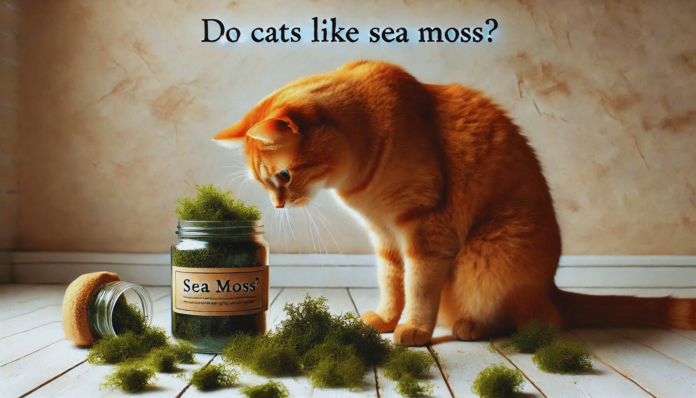Sea moss, a type of red algae, has gained attention for its potential health benefits in humans, but many pet owners wonder, do cats really like sea moss? While cats might not naturally gravitate toward this unique sea vegetable, it does offer some nutritional benefits that may support their health. This guide explores the ins and outs of sea moss for cats, covering its advantages, potential risks, and tips for safely incorporating it into their diet.
What is Sea Moss?
Sea moss, often called Irish moss, is a species of red algae found along the Atlantic coastlines. It is lauded for its rich content of vitamins, minerals, and antioxidants, making it a popular choice for health enthusiasts. But how does this nutrient-dense algae fit into a cat’s diet?
Table of Contents
Is Sea Moss Safe for Cats?
Yes, sea moss is generally safe for cats when given in moderation. It offers a wealth of nutrients beneficial to feline health, such as vitamins A, B, C, D, E, and K, along with minerals like calcium, magnesium, and iodine. However, due to its high iodine content, overconsumption can lead to thyroid issues. Therefore, it’s crucial to consult with your veterinarian before introducing sea moss into your cat’s diet.
Do Cats Like Sea Moss?
Some cats may like sea moss, but it depends on individual preferences. The natural taste and texture of sea moss can appeal to some cats, especially those with a taste for green, leafy foods. However, not all cats will be drawn to it, and their reaction can vary.
Can Cats Eat Sea Moss Gel?
Yes, cats can eat sea moss gel, but it should be unflavored and free of additives or sweeteners that could be harmful. Sea moss gel can be mixed into their regular food in small amounts. Start with a tiny portion and observe your cat for any adverse reactions before making it a regular part of their diet.
Nutritional Benefits of Sea Moss for Cats
Sea moss is packed with nutrients that can support your cat’s overall health. Here are some of the key benefits:
- Rich in Essential Nutrients: Sea moss provides an array of essential vitamins and minerals that contribute to overall health.
- Supports Digestive Health: The fiber content in sea moss aids in digestion, helping to maintain a healthy gut in cats.
- Boosts Immune System: Sea moss is packed with antioxidants, which help bolster the immune system, keeping your cat healthier.
- Promotes Healthy Skin and Fur: The nutrients in sea moss support a shiny coat and healthy skin, addressing issues like dryness and irritation.
- Thyroid Regulation: Due to its iodine content, sea moss supports thyroid health, but it should be given with caution to avoid overloading the thyroid gland.
Potential Risks and Precautions
While sea moss offers many benefits, there are some risks to be aware of:
- Overconsumption: High levels of iodine can lead to thyroid dysfunction. It’s crucial to give sea moss in controlled, small doses.
- Allergic Reactions: Some cats may be allergic to sea moss, leading to symptoms like itching, vomiting, or diarrhea. If these occur, discontinue use and consult your vet.
- Digestive Upset: Introducing sea moss too quickly can upset your cat’s stomach. Start slowly and monitor their reaction.
Can Dogs Eat Sea Moss?
Yes, dogs can also eat sea moss. Like with cats, it should be given in moderation. Sea moss can support your dog’s immune system, digestion, and skin health. However, be mindful of the iodine content, especially if your dog has pre-existing thyroid conditions.
Is Moss Cat-Friendly?
Yes, most moss types, including sea moss, are cat-friendly. However, it’s important to ensure that any moss your cat comes into contact with, especially from outdoors, is free from pesticides or chemicals. Not all natural mosses are safe, so it’s best to offer sea moss under controlled conditions.
Can Pets Take Sea Moss?
Yes, pets like cats and dogs can take sea moss, but it’s crucial to administer it in the right amounts. The rich nutrient content can be beneficial, but too much can cause health issues. Always consult your vet to determine the appropriate dosage for your pet.
Can Cats Eat Algae?
Yes, cats can eat certain types of algae, including sea moss. Algae can be a nutritious addition to their diet, offering a variety of vitamins and minerals. However, it’s essential to ensure that the algae is safe and suitable for feline consumption.
Can Cats Have Sea Salt?
No, it’s best to avoid giving cats sea salt. High sodium levels can be harmful to cats, potentially leading to kidney problems and other health issues. Sea moss itself contains some natural salts, so additional salt should be avoided.
How to Safely Offer Sea Moss to Your Cat
When offering sea moss to your cat, it’s important to follow these guidelines:
- Fresh Sea Moss: If you’re using fresh sea moss, make sure to rinse it thoroughly to remove any sand or debris before serving. It can be chopped and mixed with your cat’s food.
- Sea Moss Supplements: Choose supplements that are specifically formulated for pets, ensuring they don’t contain harmful additives.
- Sea Moss Gel: Unflavored sea moss gel can be an easy way to introduce this nutrient-rich food. Start with a small amount and mix it into their regular food.
Can Sea Moss Cure Anything?
Sea moss is not a cure-all. While it provides numerous health benefits, such as supporting the immune system and aiding digestion, it should not be viewed as a replacement for proper veterinary care or a balanced diet.
Does Sea Moss Help with Hair Growth?
Yes, sea moss can support hair growth in cats due to its rich content of vitamins and minerals that promote healthy skin and fur. Regular, moderate consumption may help improve your cat’s coat condition.
What are the Secret Benefits of Sea Moss?
Sea moss holds some lesser-known advantages that can benefit your cat’s health:
- Anti-Inflammatory Properties: Sea moss contains compounds that help reduce inflammation, which can be beneficial for cats with arthritis or other inflammatory conditions.
- Bone and Joint Health: The minerals in sea moss, such as calcium and magnesium, support strong bones and joint health.
- Immune System Boost: The antioxidants in sea moss help protect against oxidative stress, which can boost your cat’s immune system.
How Much Sea Moss is Safe Per Day?
For cats, a small amount—like a pinch of dried sea moss or a teaspoon of sea moss gel—is generally safe. It’s important to start with a minimal dose and consult your vet to determine the correct amount based on your cat’s size, age, and health condition.
When Not to Use Sea Moss?
Avoid giving sea moss to pets if:
- They have thyroid issues: The high iodine content can exacerbate existing conditions.
- They have known allergies to algae: This can prevent allergic reactions.
- They are on a low-iodine diet: Sea moss may not be suitable due to its iodine content.
How Long Does Sea Moss Last?
Proper storage is key to maintaining sea moss’s freshness:
- Sea moss can last several weeks when stored properly in the refrigerator.
- Sea moss gel typically lasts around 3-4 weeks when refrigerated.
- Always check for signs of spoilage before offering it to your cat.
Does Sea Moss Have Side Effects?
Yes, sea moss can have side effects if not used correctly:
- Digestive Upset: Introducing sea moss too quickly or in large amounts can cause digestive issues in cats.
- Allergic Reactions: Some cats may be allergic to sea moss, leading to symptoms like itching, vomiting, or diarrhea.
- Thyroid Issues: Due to its high iodine content, excessive consumption of sea moss can lead to thyroid dysfunction.
Always start with small amounts and consult your veterinarian to avoid these side effects.
Is Sea Moss Worth It?
Yes, sea moss can be a valuable supplement for cats if used responsibly. Its wide range of nutrients can support various aspects of your cat’s health. However, moderation and proper guidance from a veterinarian are essential.
Final Thoughts on Cats and Sea Moss
In conclusion, sea moss can be a beneficial addition to your cat’s diet, offering numerous health advantages. However, it’s crucial to introduce it carefully, use it in moderation, and always consult with your veterinarian to ensure it’s appropriate for your pet. With the right approach, sea moss can become a healthy and nutritious supplement for your feline friend.
FAQs
Q: Is sea moss good for cats?
A: Yes, sea moss can be beneficial for cats when given in moderation, providing essential nutrients like iodine and calcium.
Q: Is moss cat-friendly?
A: Yes, sea moss is generally safe for cats, but ensure it’s free from chemicals or pesticides.
Q: Can pets take sea moss?
A: Yes, both cats and dogs can benefit from sea moss, but always start with small amounts and consult your vet.
Q: Who should avoid sea moss?
A: Pets with thyroid conditions or iodine sensitivities should avoid sea moss due to its high iodine content.
Q: Can cats have sea moss gel?
A: Yes, as long as it’s plain and free of additives, sea moss gel can be safely given to cats in small amounts.
Q: How much sea moss is safe per day?
A: A pinch of dried sea moss or a teaspoon of sea moss gel per day is generally safe for cats.
Q: Does sea moss have side effects?
A: Yes, potential side effects include digestive upset, allergic reactions, and thyroid issues if consumed in excess.
Q: Can sea moss clear skin?
A: Yes, the vitamins and minerals in sea moss can help promote healthy skin and fur in cats.
Q: How long does sea moss last?
A: When stored in the refrigerator, sea moss can last 3-4 weeks. Always check for spoilage before use.
Curious about more ways to support your pet’s health? Dive into our article on Common Skin Issues in Dogs to learn more about pet wellness and care tips for a happier, healthier life!


